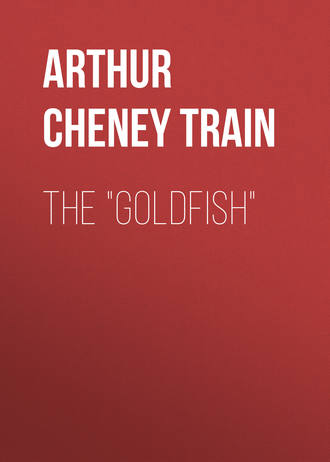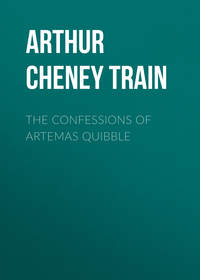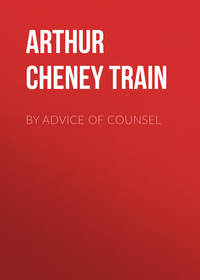 полная версия
полная версияThe "Goldfish"
My office is on the nineteenth floor of a white marble building, and I can look down the harbor to the south and up the Hudson to the north. I sit there in my window like a cliffdweller at the mouth of his cave. When I walk along Wall Street I can look up at many other hundreds of these caves, each with its human occupant. We leave our houses uptown, clamber down into a tunnel called the Subway, are shot five miles or so through the earth, and debouch into an elevator that rushes us up to our caves. Only between my house and the entrance to the Subway am I obliged to step into the open air at all. A curious life! And I sit in my chair and talk to people in multitudes of other caves near by, or caves in New Jersey, Washington or Chicago.
Louis XI used to be called "the human spider" by reason of his industry, but we modern office men are far more like human spiders than he, as we sit in the center of our webs of invisible wires. We wait and wait, and our lines run out across the length and breadth of the land—sometimes getting tangled, to be sure, so that it is frequently difficult to decide just which spider owns the web; but we sit patiently doing nothing save devising the throwing out of other lines.
We weave, but we do not build; we manipulate, buy, sell and lend, quarrel over the proceeds, and cover the world with our nets, while the ants and the bees of mankind labor, construct and manufacture, and struggle to harness the forces of Nature. We plan and others execute. We dicker, arrange, consult, cajole, bribe, pull our wires and extort; but we do it all in one place—the center of our webs and the webs are woven in our caves.
I figure that I spend about six hours each day in my office; that I sleep nearly nine hours; that I am in transit on surface cars and in subways at least one hour and a half more; that I occupy another hour and a half in bathing, shaving and dressing, and an hour lunching at midday. This leaves a margin of five hours a day for all other activities.
Could even a small portion of this time be spent consecutively in reading in the evening, I could keep pace with current thought and literature much better than I do; or if I spent it with my son and daughters I should know considerably more about them than I do now, which is practically nothing. But the fact is that every evening from the first of November to the first of May the motor comes to the door at five minutes to eight and my wife and I are whirled up or down town to a dinner party—that is, save on those occasions when eighteen or twenty people are whirled to us.
* * * * *This short recital of my daily activities is sufficient to demonstrate that I lead an exceedingly narrow and limited existence. I do not know any poor men, and even the charities in which I am nominally interested are managed by little groups of rich ones. The truth is, I learned thirty years ago that if one wants to make money one must go where money is and cultivate the people who have it. I have no petty legal business—there is nothing in it. If I cannot have millionaires for clients I do not want any. The old idea that the young country lawyer could shove a pair of socks into his carpetbag, come to the great city, hang out his shingle and build up a practice has long since been completely exploded. The best he can do now is to find a clerkship at twelve hundred dollars a year.
Big business gravitates to the big offices; and when the big firms look round for junior partners they do not choose the struggling though brilliant young attorney from the country, no matter how large his general practice may have become; but they go after the youth whose father is a director in forty corporations or the president of a trust.
In the same way what time I have at my disposal to cultivate new acquaintances I devote not to the merely rich and prosperous but to the multi-millionaire—if I can find him—who does not even know the size of his income. I have no time to waste on the man who is simply earning enough to live quietly and educate his family. He cannot throw anything worth while in my direction; but a single crumb from the magnate's table may net me twenty or thirty thousand dollars. Thus, not only for social but for business reasons, successful men affiliate habitually only with rich people. I concede that is a rather sordid admission, but it is none the truth.
* * * * *Money is the symbol of success; it is what we are all striving to get, and we naturally select the ways and means best adapted for the purpose. One of the simplest is to get as near it as possible and stay there. If I make a friend of a struggling doctor or professor he may invite me to draw his will, which I shall either have to do for nothing or else charge him fifty dollars for; but the railroad president with whom I often lunch, and who is just as agreeable personally, may perhaps ask me to reorganize a railroad. I submit that, selfish as it all seems when I write it down, it would be hard to do otherwise.
I do not deliberately examine each new candidate for my friendship and select or reject him in accordance with a financial test; but what I do is to lead a social and business life that will constantly throw me only with rich and powerful men. I join only rich men's clubs; I go to resorts in the summer frequented only by rich people; and I play only with those who can, if they will, be of advantage to me. I do not do this deliberately; I do it instinctively—now. I suppose at one time it was deliberate enough, but to-day it comes as natural as using my automobile instead of a street car.
We have heard a great deal recently about a so-called Money Trust. The truth of the matter is that the Money Trust is something vastly greater than any mere aggregation of banks; it consists in our fundamental trust in money. It is based on our instinctive and ineradicable belief that money rules the destinies of mankind.
Everything is estimated by us in money. A man is worth so and so much—in dollars. The millionaire takes precedence of everybody, except at the White House. The rich have things their own way—and every one knows it. Ashamed of it? Not at all. We are the greatest snobs in the civilized world, and frankly so. We worship wealth because at present we desire only the things wealth can buy.
The sea, the sky, the mountains, the clear air of autumn, the simple sports and amusements of our youth and of the comparatively poor, pleasures in books, in birds, in trees and flowers, are disregarded for the fierce joys of acquisition, of the ownership in stocks and bonds, or for the no less keen delight in the display of our own financial superiority over our fellows.
We know that money is the key to the door of society. Without it our sons will not get into the polo-playing set or our daughters figure in the Sunday supplements. We want money to buy ourselves a position and to maintain it after we have bought it.
We want house on the sunny side of the street, with façades of graven marble; we want servants in livery and in buttons—or in powder and breeches if possible; we want French chefs and the best wine and tobacco, twenty people to dinner on an hour's notice, supper parties and a little dance afterward at Sherry's or Delmonico's, a box at the opera and for first nights at the theaters, two men in livery for our motors, yachts and thirty-footers, shooting boxes in South Carolina, salmon water in New Brunswick, and regular vacations, besides, at Hot Springs, Aiken and Palm Beach; we want money to throw away freely and like gentlemen at Canfield's, Bradley's and Monte Carlo; we want clubs, country houses, saddle-horses, fine clothes and gorgeously dressed women; we want leisure and laughter, and a trip or so to Europe every year, our names at the top of the society column, a smile from the grand dame in the tiara and a seat at her dinner table—these are the things we want, and since we cannot have them without money we go after the money first, as the sine qua non.
We want these things for ourselves and we want them for our children. We hope our grandchildren will have them also, though about that we do not care so much. We want ease and security and the relief of not thinking whether we can afford to do things. We want to be lords of creation and to pass creation on to our descendants, exactly as did the nobility of the Ancien Régime.
At the present time money will buy anything, from a place in the vestry of a swell church to a seat in the United States Senate—an election to Congress, a judgeship or a post in the diplomatic service. It will buy the favor of the old families or a decision in the courts. Money is the controlling factor in municipal politics in New York. The moneyed group of Wall Street wants an amenable mayor—a Tammany mayor preferred—so that it can put through its contracts. You always know where to find a regular politician. One always knew where to find Dick Croker. So the Traction people pour the contents of their coffers into the campaign bags.
Until very recently the Supreme Court judges of New York bought their positions by making substantial contributions to the Tammany treasury. The inferior judgeships went considerably cheaper. A man who stood in with the Big Boss might get a bargain. I have done business with politicians all my life and I have never found it necessary to mince my words. If I wanted a favor I always asked exactly what it was going to cost—and I always got the favor.
No one needs to hunt very far for cases where the power of money has influenced the bench in recent times. The rich man can buy his son a place in any corporation or manufacturing company. The young man may go in at the bottom, but he will shoot up to the top in a year or two, with surprising agility, over the heads of a couple of thousand other and better men. The rich man can defy the law and scoff at justice; while the poor man, who cannot pay lawyers for delay, goes to prison. These are the veriest platitudes of demagogy, but they are true—absolutely and undeniably true.
We know all this and we act accordingly, and our children imbibe a like knowledge with their mother's or whatever other properly sterilized milk we give them as a substitute. We, they and everybody else know that if enough money can be accumulated the possessor will be on Easy Street for the rest of his life—not merely the Easy Street of luxury and comfort, but of security, privilege and power; and because we like Easy Street rather than the Narrow Path we devote ourselves to getting there in the quickest possible way.
We take no chances on getting our reward in the next world. We want it here and now, while we are sure of it—on Broadway, at Newport or in Paris. We do not fool ourselves any longer into thinking that by self-sacrifice here we shall win happiness in the hereafter. That is all right for the poor, wretched and disgruntled. Even the clergy are prone to find heaven and hell in this world rather than in the life after death; and the decay of faith leads us to feel that a purse of gold in the hand is better than a crown of the same metal in the by-and-by. We are after happiness, and to most of us money spells it.
The man of wealth is protected on every side from the dangers that beset the poor. He can buy health and immunity from anxiety, and he can install his children in the same impregnable position. The dust of his motor chokes the citizen trudging home from work. He soars through life on a cushioned seat, with shock absorbers to alleviate all the bumps. No wonder we trust in money! We worship the golden calf far more than ever did the Israelites beneath the crags of Sinai. The real Money Trust is the tacit conspiracy by which those who have the money endeavor to hang on to it and keep it among themselves. Neither at the present time do great fortunes tend to dissolve as inevitably as formerly.
Oliver Wendell Holmes somewhere analyzes the rapid disintegration of the substantial fortunes of his day and shows how it is, in fact, but "three generations from shirtsleeves to shirtsleeves." A fortune of two hundred thousand dollars divided among four children, each of whose share is divided among four grandchildren, becomes practically nothing at all—in only two. But could the good doctor have observed the tendencies of to-day he would have commented on a new phenomenon, which almost counteracts the other.
It may be, and probably is, the fact that comparatively small fortunes still tend to disintegrate. This was certainly the rule during the first half of the nineteenth century in New England, when there was no such thing as a distinctly moneyed class, and when the millionaire was a creature only of romance. But when, as to-day, fortunes are so large that it is impossible to spend or even successfully give away the income from them, a new element is introduced that did not exist when Doctor Holmes used to meditate in his study on the Back Bay overlooking the placid Charles.
At the present time big fortunes are apt to gain by mere accretion what they lose by division; and the owner of great wealth has opportunities for investment undreamed of by the ordinary citizen who must be content with interest at four per cent and no unearned increment on his capital. This fact might of itself negative the tendency of which he speaks; but there is a much more potent force working against it as well. That is the absolute necessity, induced by the demands of modern metropolitan life, of keeping a big fortune together—or, if it must be divided, of rehabilitating it by marriage.
There was a time not very long ago when one rarely heard of a young man or young woman of great wealth marrying anybody with an equal fortune. To do so was regarded with disapproval, and still is in some communities. To-day it is the rule instead of the exception. Now we habitually speak in America of the "alliances of great families." There are two reasons for this—first, that being a multi-millionaire is becoming, as it were, a sort of recognized profession, having its own sports, its own methods of business and its own interests; second, that the luxury of to-day is so enervating and insidious that a girl or youth reared in what is called society cannot be comfortable, much less happy, on the income of less than a couple of million dollars.
As seems to be demonstrated by the table of my own modest expenditure in a preceding article, the income of but a million dollars will not support any ordinary New York family in anything like the luxury to which the majority of our young people—even the sons and daughters of men in moderate circumstances—are accustomed.
Our young girls are reared on the choicest varieties of food, served with piquant sauces to tempt their appetites; they are permitted to pick and choose, and to refuse what they think they do not like; they are carried to and from their schools, music and dancing lessons in motors, and are taught to regard public conveyances as unhealthful and inconvenient; they never walk; they are given clothes only a trifle less fantastic and bizarre than those of their mothers, and command the services of maids from their earliest years; they are taken to the theater and the hippodrome, and for the natural pleasures of childhood are given the excitement of the footlights and the arena.
As they grow older they are allowed to attend late dances that necessitate remaining in bed the next morning until eleven or twelve o'clock; they are told that their future happiness depends on their ability to attract the right kind of man; they are instructed in every art save that of being useful members of society; and in the ease, luxury and vacuity with which they are surrounded their lives parallel those of demi-mondaines. Indeed, save for the marriage ceremony, there is small difference between them. The social butterfly flutters to the millionaire as naturally as the night moth of the Tenderloin. Hence the tendency to marry money is greater than ever before in the history of civilization.
Frugal, thrifty lives are entirely out of fashion. The solid, self-respecting class, which wishes to associate with people of equal means, is becoming smaller and smaller. If an ambitious mother cannot afford to rent a cottage at Newport or Bar Harbor she takes her daughter to a hotel or boarding house there, in the hope that she will be thrown in contact with young men of wealth. The young girl in question, whose father is perhaps a hardworking doctor or business man, at home lives simply enough; but sacrifices are made to send her to a fashionable school, where her companions fill her ears with stories of their motors, trips to Europe, and the balls they attend during the vacations. She becomes inoculated with the poison of social ambition before she comes out.
Unable by reason of the paucity of the family resources to buy luxuries for herself, she becomes a parasite and hanger-on of rich girls. If she is attractive and vivacious so much the better. Like the shopgirl blinded by the glare of Broadway, she flutters round the drawing rooms and country houses of the ultra-rich seeking to make a match that will put luxury within her grasp; but her chances are not so good as formerly.
To-day the number of large fortunes has increased so rapidly that the wealthy young man has no difficulty in choosing an equally wealthy mate whose mental and physical attractions appear, and doubtless are, quite as desirable as those of the daughter of poorer parents. The same instinct to which I have confessed myself, as a professional man, is at work among our daughters and sons. They may not actually judge individuals by the sordid test of their ability to purchase ease and luxury, but they take care to meet and associate with only those who can do so.
In this their parents are their ofttimes unconscious accomplices. The worthy young man of chance acquaintance is not invited to call—or, if he is, is not pressed to stay to dinner. "Oh, he does not know our crowd!" explains the girl to herself. The crowd, on analysis, will probably be found to contain only the sons and daughters of fathers and mothers who can entertain lavishly and settle a million or so on their offspring at marriage.
There is a constant attraction of wealth for wealth. Poverty never attracted anything. If our children have money of their own that is a good reason to us why they should marry more money. We snarl angrily at the penniless youth, no matter how capable and intelligent, who dares cast his eyes on our daughter. We make it quite unambiguous that we have other plans for her—plans that usually include a steam yacht and a shooting box north of Inverness.
There is nothing more vicious than the commonly expressed desire of parents in merely moderate circumstances to give their children what are ordinarily spoken of as "opportunities." "We wish our daughters to have every opportunity—the best opportunities," they say, meaning an equal chance with richer girls of qualifying themselves for attracting wealthy men and of placing themselves in their way. In reality opportunities for what?—of being utterly miserable for the rest of their lives unless they marry out of their own class.
The desire to get ahead that is transmitted from the American business man to his daughter is the source of untold bitterness—for, though he himself may fail in his own struggle, he has nevertheless had the interest of the game; but she, an old maid, may linger miserably on, unwilling to share the domestic life of some young man more than her equal in every respect.
There is a subtle freemasonry among those who have to do with money. Young men of family are given sinecures in banks and trust companies, and paid many times the salaries their services are worth. The inconspicuous lad who graduates from college the same year as one who comes from a socially prominent family will slave in a downtown office eight hours a day for a thousand dollars a year, while his classmate is bowing in the ladies at the Fifth Avenue Branch—from ten to three o'clock—at a salary of five thousand dollars. Why? Because he knows people who have money and in one way or another may be useful sometime to the president in a social way.
The remuneration of those of the privileged class who do any work at all is on an entirely different basis from that of those who need it. The poor boy is kept on as a clerk, while the rich one is taken into the firm. The old adage says that "Kissing goes by favor"; and favors, financial and otherwise, are given only to those who can offer something in return. The tendency to concentrate power and wealth extends even to the outer rim of the circle. It is an intangible conspiracy to corner the good things and send the poor away empty. As I see it going on round me, it is a heartless business.
Society is like an immense swarm of black bees settled on a honey-pot. The leaders, who flew there first, are at the top, gorged and distended. Round, beneath and on them crawl thousands of others thirsting to feed on the sweet, liquid gold. The pot is covered with them, layer on layer—buzzing hungrily; eager to get as near as possible to the honey, even if they may not taste it. A drop falls on one and a hundred fly on him and lick it off. The air is alive with those who are circling about waiting for an advantageous chance to wedge in between their comrades. They will, with one accord, sting to death any hapless creature who draws near.
* * * * *Frankly I should not be enough of a man to say these things if my identity were disclosed, however much they ought to be said. Neither should I make the confessions concerning my own career that are to follow; for, though they may evidence a certain shrewdness on my own part, I do not altogether feel that they are to my credit.
When my wife and I first came to New York our aims and ideals were simple enough. I had letters to the head of a rather well-known firm on Wall Street and soon found myself its managing clerk at one hundred dollars a month. The business transacted in the office was big business—corporation work, the handling of large estates, and so on. During three years I was practically in charge of and responsible for the details of their litigations; the net profit divided by the two actual members of the firm was about one hundred and fifty thousand dollars. The gross was about one hundred and eighty thousand, of which twenty thousand went to defray the regular office expenses—including rent, stenographers and ordinary law clerks—while ten thousand was divided among the three men who actually did most of the work.
The first of these was a highly trained lawyer about forty-five years of age, who could handle anything from a dog-license matter before a police justice to the argument of a rebate case in the United States Supreme Court. He was paid forty-five hundred dollars a year and was glad to get it. He was the active man of the office. The second man received thirty-five hundred dollars, and for that sum furnished all the special knowledge needed in drafting railroad mortgages and intricate legal documents of all sorts. The third was a chap of about thirty who tried the smaller cases and ran the less important corporations.
The two heads of the firm devoted most of their time to mixing with bankers, railroad officials and politicians, and spent comparatively little of it at the office; but they got the business—somehow. I suppose they found it because they went out after it. It was doubtless quite legitimate. Somebody must track down the game before the hunter can do the shooting. At any rate they managed to find plenty of it and furnished the work for the other lawyers to do.
I soon made up my mind that in New York brains were a pretty cheap commodity. I was anxious to get ahead; but there was no opening in the firm and there were others ready to take my place the moment it should become vacant. I was a pretty fair lawyer and had laid by in the bank nearly a thousand dollars; so I went to the head of the firm and made the proposition that I should work at the office each day until one o'clock and be paid half of what I was then getting—that is, fifty dollars a month. In the afternoons an understudy should sit at my desk, while I should be free.
I then suggested that the firm might divide with me the proceeds of any business I should bring in. My offer was accepted; and the same afternoon I went to the office of a young stockbroker I knew and stayed there until three o'clock. The next day I did the same thing, and the day after. I did not buy any stocks, but I made myself agreeable to the group about the ticker and formed the acquaintance of an elderly German, who was in the chewing-gum business and who amused himself playing the market.





